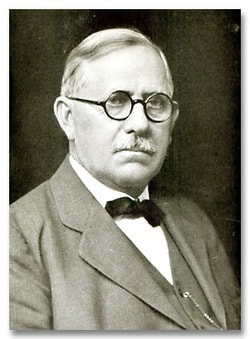
Our readers will remember that in reading the Holy Book we very frequently run across the word "moth" or "moth-eaten garment."
One remarkable passage is found in Isa. 50:9, "Behold, the Lord God will help me; who is he that shall condemn me? lo, they all shall wax old as a garment; the moth shall eat them up." The Bible has much to say concerning the moth, and we very frequently hear the peculiar expression "a moth-eaten garment." That expression is a very familiar one in the reading of God's Word.
We next notice, in Job 4:19, Job speaks of our bodies as "houses of clay ... which are crushed before the moth." In speaking of those that have suffered severe judgments, Job also says they are "as a garment that is moth eaten" (13:28). To further illustrate man's folly in providing earthly things, or in building up his fortunes by methods of injustice, Job also says, "He buildeth his house as a moth," to set forth God's judgment against the priest and the people and the princes of Israel for their manifold sins (27:18).
We find the little prophet Hosea comes to the platform and sets forth his warning. Here is his peculiar statement: "Therefore will I be unto Ephraim as a moth, and to the house of Judah as rottenness" (5:12); but in the margin it says, "as a worm."
The Apostle James, in threatening the rich men says, "Your riches are corrupted, and your garments are moth-eaten" (5:2). This seems to unite two strange facts, corruption and moth-eaten garments. My judgment is it would be the black, dark, subtle things that are hidden in the hearts of men that crave this world more than they crave righteousness and holiness.
Now we notice that Jesus comes at this place and refers to the little moth. If the reader will turn to that wonderful Sermon on the Mount, Christ says to us, "Lay not up for yourselves treasures upon earth, where moth and rust doth corrupt, and where thieves break through and steal: but lay up for yourselves treasures in heaven, where neither moth nor rust doth corrupt, and where thieves do not break through nor steal (Matt. 6:19-20)." Then He adds this wonderful statement: "For where your treasure is, there will your heart be also."
The reader will notice here the strange similarity between a thief and a moth. Jesus seems to put the little moth along side of the thief. I suppose that He is revealing to you the fact that the thief will come uninvited, unsolicited, and, in fact, undesired, and pilfer your home, and carry away your most valuable treasures. It would be common for a thief to carry away your best fur coat and flannel wear and woolen blankets, and all the household goods that are so valuable. Just so with the little moth. He also will come uninvited and unsolicited and undesired, and enter into the house without your knowledge and simply make havoc of the best things on the plantation.
The reader will remember how in our first text quoted, Isa. 50:9, the prophet there compares the wicked to moth-eaten clothes, and tells us they will all wax old as a moth-eaten garment, and that the moth will eat them up. So we see the wicked will finally be consumed and be as worthless as a moth-eaten garment.
Robinson, Reuben A. (Bud). The Collected Works of 'Uncle Bud' Robinson. Jawbone Digital. Kindle Edition.
 RSS Feed
RSS Feed